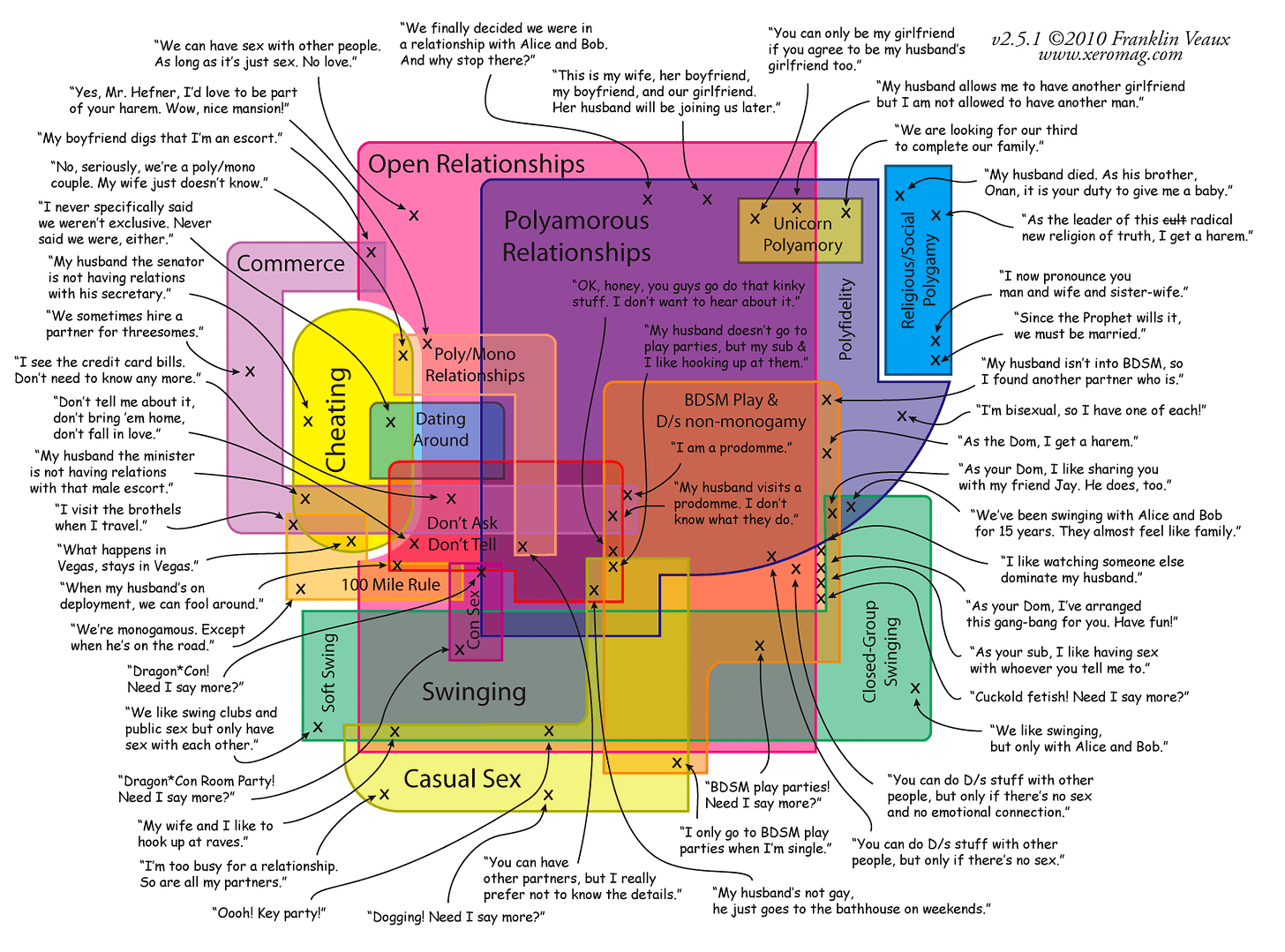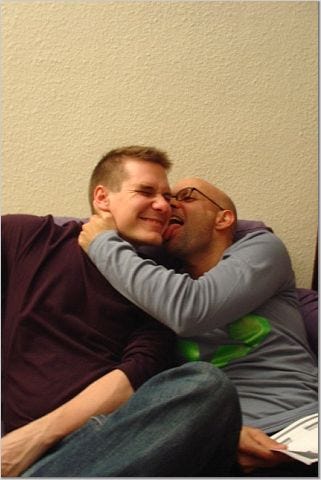Should Open Relationships Be Easy? An Open Thread
Whether you practice ethical non-monogamy, have embraced a polyamorous lifestyle, or strive for some sort of monogamish balance, figuring out the rules—and reasons—for making it work is a process.

This week, we published a wonderful essay by Asya Graf that details her sexual relationship with a man, while also still desiring her wife. As she so eloquently distills into a paragraph:
“I could use neat identity words to try to tell you a true story. Bisexual, androsexual, homoromantic, subby. Would that be clearer? Or I can tell you a story in a different genre, in the language of psychotherapy, my profession, about growing up a fatherless girl, about my unresolved, ungrieved longing for Daddy. Or I can say, it’s just that I missed dick. Or that I never really dated men and had to try, to either walk through that open door or close it for good. I could say, I was about to turn 40 and had to find out. But each of these stories leaves something vital out, something to do with my confusion about desire and home.”
Wow! What an impressive exploration of a convoluted psychological reality. I was thrilled to publish this essay, not only because of the excellent writing, but because I learned so much in the process. Asya is already a fantastic writer and I’m so proud of what she and my co-editor Michael Narkunski accomplished getting it out into the world (he also wrote about deciding that a monogamous relationship was best for him in an essay you should definitely read if you haven’t already).
It wasn’t a conscious plan, but we also published a juicy questionnaire with Ty Beaver this week, the author of the Sitting Queerly newsletter, who explained how he embraced his queerness later in life and came out to his wife and friends before pursuing a sexual relationship with a man outside his marriage. As he states:
“I love my wife. I care very deeply for her. And for a long time, I convinced myself that she was meeting all the needs I should expect to be met in a marriage. At least, as was taught to me through my childhood and engagement with the culture around me. Until I accepted my queerness, I never shared it with her, or anybody for that matter. I kept that part of myself buried beneath a mountain of shame and guilt. It is the root of my greatest insecurities and fears.”
When I delved deeper into the archives of his Substack, I read about how he began “reconciling his wedding vows with his pursuit of authenticity,” and even learned a new phrase that refers to people in mixed orientation marriages (MOMs???), who either have open marriages or practice ethical non-monogamy.
Yeah, it’s complicated. As this handy diagram below attempts to capture. Or as one person stated in the recent New York magazine cover story that investigated how a polycule might work: “Navigating the relationship dynamics is kind of generally a fun thing for us. It’s like for relationship nerds.” [Emphasis mine]

So, it turns out that, not only are we celebrating Bisexuality Visibility Month—a time to amplify bi-romantic awareness and combat bi-erasure—we are looking at stories and lessons in ways people have adapted their lives to pursue authentic, happy selves—despite all the guilt, confusion, and awkwardness that can come with it.
It’s something I understand personally. One reason I resisted legal marriage for quite a bit—despite being in a long term, loving and committed one for decades—was because it has traditionally been defined under the assumption of strict monogamy. Before marriage equality became legal for everyone in the United States, I routinely was verbally abused for being an enemy to “the cause,” so I understand the risk of disclosure.
“You’re the reason gay guys will never get equal rights!” one young man yelled at me as we lay in bed after we’d both gotten off. My phone vibrated and I replied to a message. When I told him I was texting my partner that I was finished and headed home, he erupted. I don’t think I should be ashamed, but I didn’t enjoy the admonishment either. At the time, I imagined my situation could be a dealbreaker so I didn’t divulge when hooking up at a bar. Then I realized my stable relationship was also a turn on for many guys, who felt like they could have fun and try things out with me sans the expectation that there would be a possibility of dating. I started coming out about being “monogamish,” as Dan Savage termed it years ago, to head off the negativity.
Although many of my married straight friends say they wish they could have NSA encounters within a committed relationship, they also don’t know how to negotiate the reality. “I think I’d be too jealous,” the refrain goes. They want to fantasize about trysts, but the truth is, I agree with them: I don’t think most of them could handle the roller coaster of emotions and lack of rigid habits. If marriage is a type of surrender, I’m forever on my toes, ready for a potential conquest. But how one adapts and navigates the choppy waters can make all the difference. When Patricio and I first started dating over 20 years ago, we made a few rules. Everyone has different agreements; we started with three:
No sleepovers.
No repeats.
Be honest and tell one another everything.
The idea was to curb the possibility of emotional attachments. Cuddling under the covers on a cold winter night is more intimate to us than many other possibilities and would remain our special union. A regular sexual partner can also become a habitual distraction, so we wanted to limit contact.
Most of my sexual life consisted of the three monogamous boyfriends I had since I was 17. Each lasted years, and each time I thought he would be the last. Growing up with parents who dated in high school, married immediately upon graduation, and expressed their undying commitment to one another, I tried to mirror that path. It was a love story that held such power over my imagination (as I’ve written about), I didn’t realize that it didn’t prepare me for what a mature, happy relationship could be like.
So I tried to do with Patricio as I’d done before: He was my one and only, my man for eternity. And that meant monogamy. He’s 11 years older, however, and he didn’t want me to hitch my sexual happiness to a single person.
“Do you want to sleep with other guys?” he asked a few months in. It was my first test in being honest again after past relationships taught me that my frankness caused rifts. But with him, it was different.
“Of course I’m attracted to other people,” I began. “But that doesn’t mean...”
“I think you should be able to have sex with others, just sex, so you don’t miss out on anything,” he interrupted. And then we started to discuss what that meant and how it could work.
We didn’t want to deny potential experiences that we could regret and then hold against the other. The lies we heard other couples tell seemed much more destructive than anything else. It wasn’t only heterosexual hypocrisy; I know gay men who stick it out for 30 years or more but have illicit affairs that make them feel shame and guilt. The three rules seemed sufficient. Soon, however, other rules followed.
Since Patricio shaves his head daily, no bald guys (since broken). And because of his profession: no architects (broken, but my pickup was a landscape architect with great legs, so I didn’t think it really counted). Feeling the need to craft a rule of my own, I told him I didn’t want him with guys who resembled my “boy next door” look (broken, but who can blame him really?). Of course, all of these proscriptions were just permutations of a fear that we could replace each other physically, and therefore emotionally. Which hasn’t been true.
“I’m glad you’re having fun,” he would say, knowing I was returning to bed with him every night.
Haven’t we tired of all these rendezvous over the years? Sorta. Now that I’m older than the age when Patricio and I first met, somehow I entered into “daddy” territory myself and have had guys fetishize me for being the older one there to satisfy their fantasy (although I’ve also been told I have “big brother energy,” which creeped me out at first since I am in fact the oldest of four siblings and, therefore, an actual big brother). I have some regular sex friends—which is easier and less risky than always searching out some new stranger.
Patricio and I have been terribly lucky. Most marriage problems arise from issues with money or sex (as discussed in a previous open thread), and we’ve somehow avoided both. It’s difficult to explain the reasons why one person loves another, but he and I found a way to challenge and nurture each other. We helped the other achieve lifelong individual dreams and continue to imagine new ones together. When I learned the Spanish word for soulmate, media naranja, I knew I understood it. A half of an orange: The phrase sounds strange, but I identify with the image of two halves that can come together but also function as separate parts—and be squeezed and enjoyed. Which can also mean making space for the other’s quirks and desires.
I still recall a Sunday several years ago when I returned home after running errands. “Hello, I’m home!” I called out as I opened the door of our apartment and kicked off my shoes. I heard giggles from the other room and walked around the corner and saw them there, as if caught in a childlike conspiracy.
“Umm, hi, this is Gilles,” Patricio said. An attractive man with close-cropped hair sat on the back of the sofa.
“I picked up groceries, and you ordered in,” I said. Not sure how I came up with a sitcom-ready quip on the spot, I placed the plastic bags on the counter.
“Hello,” Gilles said. He stood and kissed my cheeks in greeting. “It’s nice to meet you.”
“Nice to meet you, too,” I said. I noticed Patricio’s face, flushed, and how Gilles’s eyes twinkled.
“Do you live in the neighborhood?” I asked, not wanting to be a rude host.
“Yes,” he replied. But it was clear it was time for him to go, not small talk. Postcoital boyfriend banter can only be pleasantly awkward for so long. “Well...I must be going, I suppose, so you may have your dinner.”
“I’ll walk you to the door,” Patricio said.
After he was gone, as I put away the lettuce and marmalade, I said, “He was hot. Did you have fun?”
“Yeah. He has a little of a kinky side,” Patricio said, picking up a few items to place in the fridge.
“Well he is French,” I quipped.
And that’s how it goes in our “monogamish” relationship. Not every day, and not very often, to be honest, but on those lazy Sundays (or lucky Tuesdays) when one spies someone on the subway platform and smiles, it can happen. Patricio and I still tell each other everything. Well, almost. A little mystery is always nice, and he’s a little less interested in the dirty details these days.
Yet, every time I worried about divulging the truth, I was surprised to find that he accepted me: no matter what stupid mistake or blunder I made. And I’ve reciprocated with a sympathetic ear—even when it’s been all I could bear. But as we’ve matured into our LTR (as longterm relationships are known on hookup sites), it’s not necessary (or beneficial) to describe every encounter in explicit detail.
“Did you have fun?” “Was he nice?” “Are you tired and ready to go bed?” That became a typical post-hookup refrain.
It’s how we learned what love is—to help one another be better, stronger, happier people, not to hold the other back, punish, and restrict. It can sometimes mean difficult sacrifices rather than grudging compromises. I’ve learned not to think that one single person can fulfill every part of me, and that the most important rule never changed: honesty.
What about you? Do you practice ethical non-monogamy? Do you have rules or guardrails? Is it easy or has it been difficult? Should it be easy? Is jealousy a turn-on or a dealbreaker?Tell us more—or of course write your own essay or answer our questionnaire and share your experiences so that others might be able to glean some new ways of navigating this fun, exciting and, often, complicated life we’ve been given.






Folks have prolly heard enough from me but my wife and I make it work with some basic ground rules and courtesies.
Obviously I use protection. She would prefer I have a steady other just to reduce risk but that’s easier said than done. She is undecided on how much she wants me to share so I err on the side of not sharing much; she knew when I was with my ex-bf what I was up to but otherwise I’ll just say I’m meeting up with a friend.
It worked out really well this past week as my wife usually takes our oldest to her theater rehearsals as she is the theater nerd between us. However, that would mean she had to miss a good portion of the prez debate. I offered to drop her off so I could meet up with a guy right after. She was elated. And I had no idea Teresa in the debate so it kept me from having to hear TFG’s voice.
There was a time when both my husband and I were possessed of more magnificent libidos: we reached an agreement on opening our relationship.
We adopted a model that I pretended was Japanese—I met my husband in Japan and had witnessed non-monogamy in great detail before falling in love. The model was thus: as long as neither he nor I found out about the dalliances the other had, they were okay.
But that wasn't wholly Japanese in practice. It was more of a salve for my jealousy.
I, too, had grown up thinking that love and marriage were meant to provide one another with everything. And when I went a-humping, I was secure in knowing that my fast-food romances merely scratched a physical itch.
But when my husband did the same (I always knew—he turned his phone off), I spiraled into envy. Was his one-time inamorato more handsome? Better equipped? What was *I* lacking, and would that lack drive my husband away from me eventually?
Talking about it seemed impossible. I *knew* I was irrational. I also knew that there was an aspect of catch-up at play. When my husband and I first met, I had had a decade of erogenous exploration in my Bank of Experience. He barely had two years. Sauce for the gander, I hear you say.
A mental realignment began when we married eleven years ago when we were twenty years into our relationship. And, perhaps more importantly, when my symptoms of morbid anxiety, at last, subsided nine years ago (when my husband, at last, had a US green card, I, at last, had a full-time job after nine years of freelance hell, and we, at last, owned a home once more), the jealousy began to ebb.
Every day, he makes a choice, as I make mine. Every night, he is beside me, and I am beside him. He loves me, and I finally, finally get it.